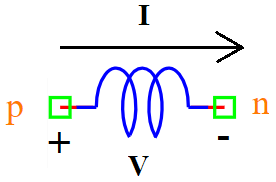Inductor
Symbol
Information

An inductor is a passive electrical component that stores energy in a magnetic field when electrical current flows through it. The fundamental equation governing inductors is:
Where:
\(V\) is the voltage across the inductor (Volts)
\(I\) is the current flowing through the inductor (Amperes)
\(L\) is the inductance (Henries, H)
\(\frac{dI}{dt}\) is the rate of change of current
Inductors are used in filtering, energy storage, and oscillatory circuits.
Ports
p: Positive terminal
n: Negative terminal
Symbol description
Field |
Value |
|---|---|
Symbol.name |
Inductor |
Symbol.file |
Inductor.sym |
Symbol.directory |
Basic |
Symbol.referance |
|
Model.name |
|
Model.file |
Inductor.py |
Model
The Inductor model implements an ideal inductor.
An inductor stores electrical energy in a magnetic field and its voltage is proportional to the rate of change of current through it.
Attributes:
V (signal): Output voltage signal across the inductor, defined between nodes (p, n).
I (signal): Input current signal through the inductor, defined between nodes (p, n).
L (param): Inductance value in Henries (H), default is 1.0 mH.
Methods:
analog(): Defines the inductor behavior using the equation:
from pyams.lib import model, signal, param, voltage, current
class Inductor(model):
"""
Inductor model based on the equation: V = L * dI/dt
"""
def __init__(self, p, n):
# Signal declaration
self.V = signal('out', voltage, p, n)
self.I = signal('in', current, p, n)
# Parameter declaration
self.L = param(1e-3, 'H', 'Inductance value')
def analog(self):
"""Defines the inductor’s current-voltage relationship"""
self.V += self.L * self.I.dt()
Command syntax
The syntax for defining an inductor in a PyAMS simulation:
# Import the model
from pyams.models import Inductor
# Lname: is the name of the inductor instance
# p, n: The connection points in the circuit
Lname = Inductor(p, n)